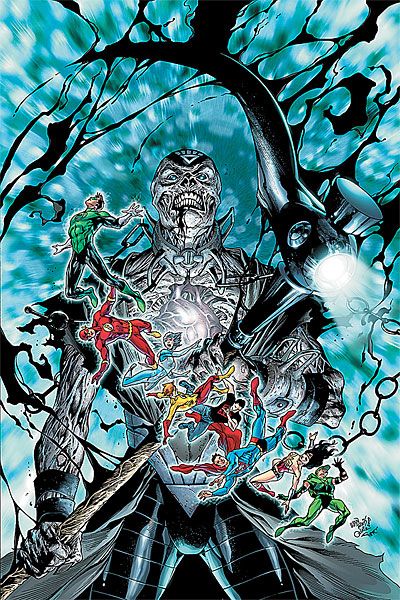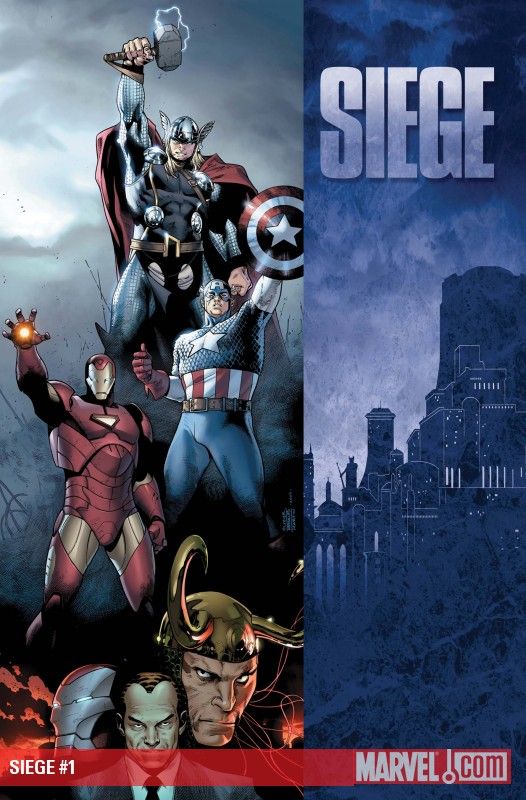Life in the Event Age has been tumultuous for superhero fans. Ever since Infinite Crisis and Civil War cemented a storytelling mode that had begun showing sparks of life during such proto-events as Avengers Disassembled, House of M, Identity Crisis and the pre-Infinite Crisis minis, the Big Two have been dominated by massive meta-stories that tie in, spin off, and otherwise control the direction of nearly every title in their respective lines.
On the one hand, sales levels have been tough to argue with, interest in the characters at the heart of the events has spiked (cf. the Avengers, Green Lantern), and fan-favorite writers from Brian Bendis and Mark Millar to Geoff Johns and Grant Morrison have had the opportunity to make their mark on their respective universes in a nearly unprecedented way. On the other hand, critical reaction has been mixed, reader complaints about the need to follow multiple books to make sense of a single storyline have been abundant, and one assumes individual creators have chafed under the need to tell stories dictated from the top down -- a trio of factors leading to a sense of dissatisfaction with this method of superhero storytelling commonly referred to as "event fatigue." As the era of the event nears its sixth birthday and the concept of "event fatigue" gains traction in the fan community, what does the future hold?
DC's Senior Vice President - Executive Editor Dan DiDio and Marvel's Editor-in-Chief Joe Quesada offered conflicting takes on this question in a pair of recent interviews at Comic Book Resources. And given their companies' respective plans in this arena -- DC's Blackest Night rages on and a Superman-centric event is rumored to anchor its 2010 schedule, while Marvel's upcoming Siege is supposedly the last in a chain of events stretching back to Disassembled -- their responses made a great deal of sense.
First up was DiDio, who in his November 11th interview with CBR honchos Jonah Weiland and Kiel Phegley dismissed the notion of "event fatigue" as, more or less, a coded phrase for "crappy comic fatigue":
Jonah Weiland: There's been a lot of talk over the past couple of years of "event fatigue," yet here you guys are having a tremendous amount of success with a big event. Is event fatigue a real thing?
[Dan DiDio:] No. Event fatigue is a statement for "The event doesn't work" or "The event isn't interesting." That's what event fatigue is. If you're creating stories just for the sake of having events to tie things together with no real meat on the bones, then you're going to have event fatigue because you have all this promotion and drive and anticipation, but you've under-delivered on what the expectations are. That's what some people felt about what "Countdown to Final Crisis" was. They felt it didn't build properly off the event or for the amount of anticipation they had for the series itself. So what we're trying to do now is really meet the expectations for what's going on. As we saw with "Blackest Night," the anticipation was growing, and there was real interest there. People wanted to see more, so it was easy to grow the story out because of the interest in more material. Event fatigue just means "I don't like what you're doing!" [Laughs]
But when asked to comment on DiDio's analysis in his latest Cup o' Joe interview with Jonah and Kiel, Quesada took a markedly less skeptical approach to the concept:
Joe Quesada: I think it's a matter of how you're defining event fatigue. However, I personally think it's a mistake to think that it's not a reality, but that's just me. Whether it's blockbuster movies or blockbuster comic events, there is a point where you can produce the greatest stories known to man, and if you overload your customer base and constantly clang the dinner bell, you will end up eating your own tail.
Look, the truth of the matter is that, if you market a story as an event, even if it's not the greatest story known to man, I will bet you dollars to donuts that you're going to sell better numbers on those titles than anything else in your line. Fatigue, however, comes in many forms, and in some cases may be tough to quantify. Who is to say that "Blackest Night" wouldn't have sold three times what it did if it hadn't been following the plethora of events that have been produced by both DC and Marvel over the last several years? That's the mystery number, that's the thing that is so very hard to put a finger on the pulse of. Sure, we can say the economy has something to do with it, but I would also argue that when you end up screaming at your fans, "This is it, Weezy! This is the big one!" that eventually, some stop listening.
[...]
Again, within the world of creating stories and creating entertainment there is ebb and flow. And sometimes you've got to step back and try to feel it and where we're at within it.[...] If you keep hitting [the audience] and hitting them and hitting them, each subsequent event - I firmly believe this - will lose its impact. Every company has seen this over the history of comics. You can not constantly hit that note, because eventually it becomes like crack or heroin. Your publishing bottom line starts to depend on it and you end up forgetting how to just publish comics if you're not careful. How do we make it bigger? How do we make it better? Eventually, it's just the point of diminishing returns where you're just looking for that next high, fiscally and creatively. I hate to use the drug metaphor, but I remember bringing this up at an editorial meeting a few years ago where I said, "There's going to come a point as a company where we're going to have to take a stand and pull back to regroup. Let's reset and figure out what the next phase is for the Marvel Universe." And, "Siege" is that perfect point.
So I do believe there is a point when I say "event fatigue" where you need to recharge your batteries. If not, eventually you're going to make a big mistake, and then what'll happen is that events will become something you can't rely on. It'll become a tool you can't use.
Interestingly, Quesada ascribes "event fatigue" not just to the audience, but to editors and creators as well:
Also, when I'm referring to event fatigue, it's not just about the readership. It's event fatigue within editorial. It's event fatigue within the creative community. There's a lot of that stuff going on where you start to hear your creators and editors talk about this exhaustion that comes with putting these events together. So in our case, we're taking a look at this and saying, "It's a good time to pull back from this for a bit. It's good for our readership, it's good for our creators, it's good for our publishing division to take a breather, to take a look at what our creators want to do and the stories they want to tell and then to come back on all cylinders." Quite frankly, I look at this particular time as an investment in our future. It's a clearing of our heads so that we can then dig in and blow our reader's minds one more time.
[...]
Jonah Weiland: You bring up an interesting point about how this affects the readership, but also creative and editorial. Since you've made this shift over the past six months to wrap big events up for a while, have you seen a reinvigoration of your staff in any way?
Absolutely. And it's still a little early to tell because we're just now in the throes of "Siege." This is something we'll have to talk about six months down the road, to see how it affected not just the editorial crew, but our creators as well. I'll be perfectly honest with you, there is some trepidation as well. We're saying, "We're going to operate without a net for a while, here." We have to bite that bullet and try to ignore the natural impulses that drive us. That's the scary thing about "event publishing" - it's a tempting carrot that really blinds you to the stick. It would be very easy after "Siege" to prepare for the next big blockbuster concept for the Marvel Universe, but I don't think it is the smartest thing to do. We need a little break. We could absolutely knock something out of the park and sell a kazillion books right on the heels of "Siege," but when you look at the future of publishing, two or three years down the road, will that future be brighter if we continued grinding it, or will it look dimmer because we're burning the candle at both ends?
All in all, it's a pretty fascinating study in contrasts, and one that's ripe for analysis. A couple of years ago I predicted that events would be the Big Two's main storytelling model for the foreseeable future. If you're Dan DiDio, looking at Blackest Night's sales performance -- not to mention the wider sales landscape for the company, dominated by projects and franchises spearheaded by superstar event writers like Johns and Morrison -- it's tough to see why you'd disagree. But by the same token, if you're Joe Quesada and you've spent several years keeping nearly every title you publish within the same status quo -- Marvel's events have generally been reflected in far more individual series than DC's -- it's easy to see the appeal of giving more writers more freedom to do their own thing, and readers more freedom to pick and choose the precise flavor of superhero storytelling they want, by shifting to smaller, franchise-specific mini-events.
Still, these things are rather fluid. As the shift from The Sinestro Corps War to Blackest Night has shown, franchise-based events can easily explode given the right combination of fan interest and editorial enthusiasm. At a company like Marvel, where the Avengers have become so firmly established as a flagship franchise, any Avengers-centric storyline could be seen as a de facto event anyway. Meanwhile, at DC, where events have traditionally had less all-encompassing ramifications -- they've never really established a line-wide "tone" as did Marvel with "The Initiative" and "Dark Reign" -- it's plausible that big old-fashioned events are more sustainable. I suppose we can check back in this time next year to see how things shook down, but for now, the fate of the Event Age is very much up in the air.



